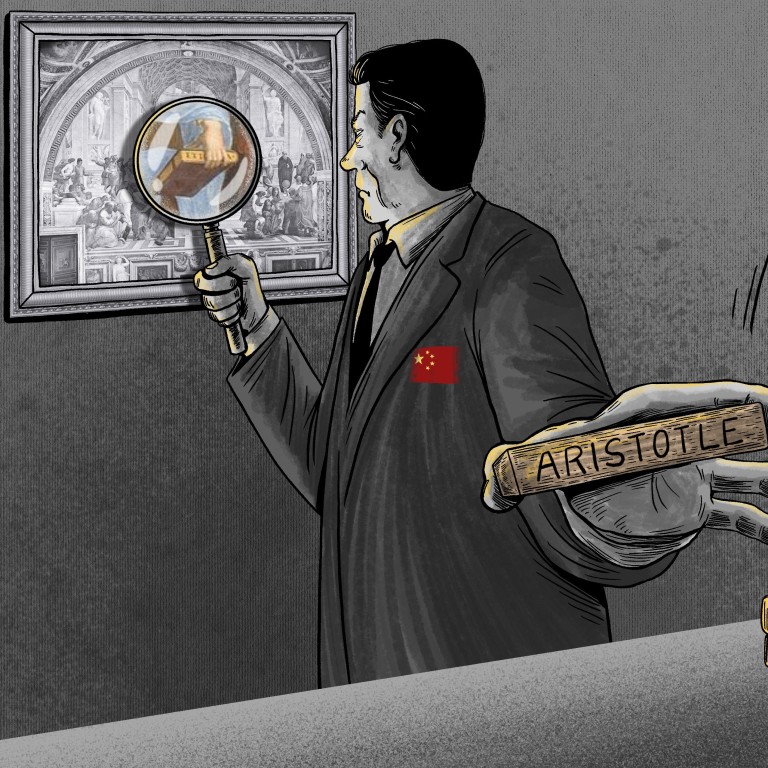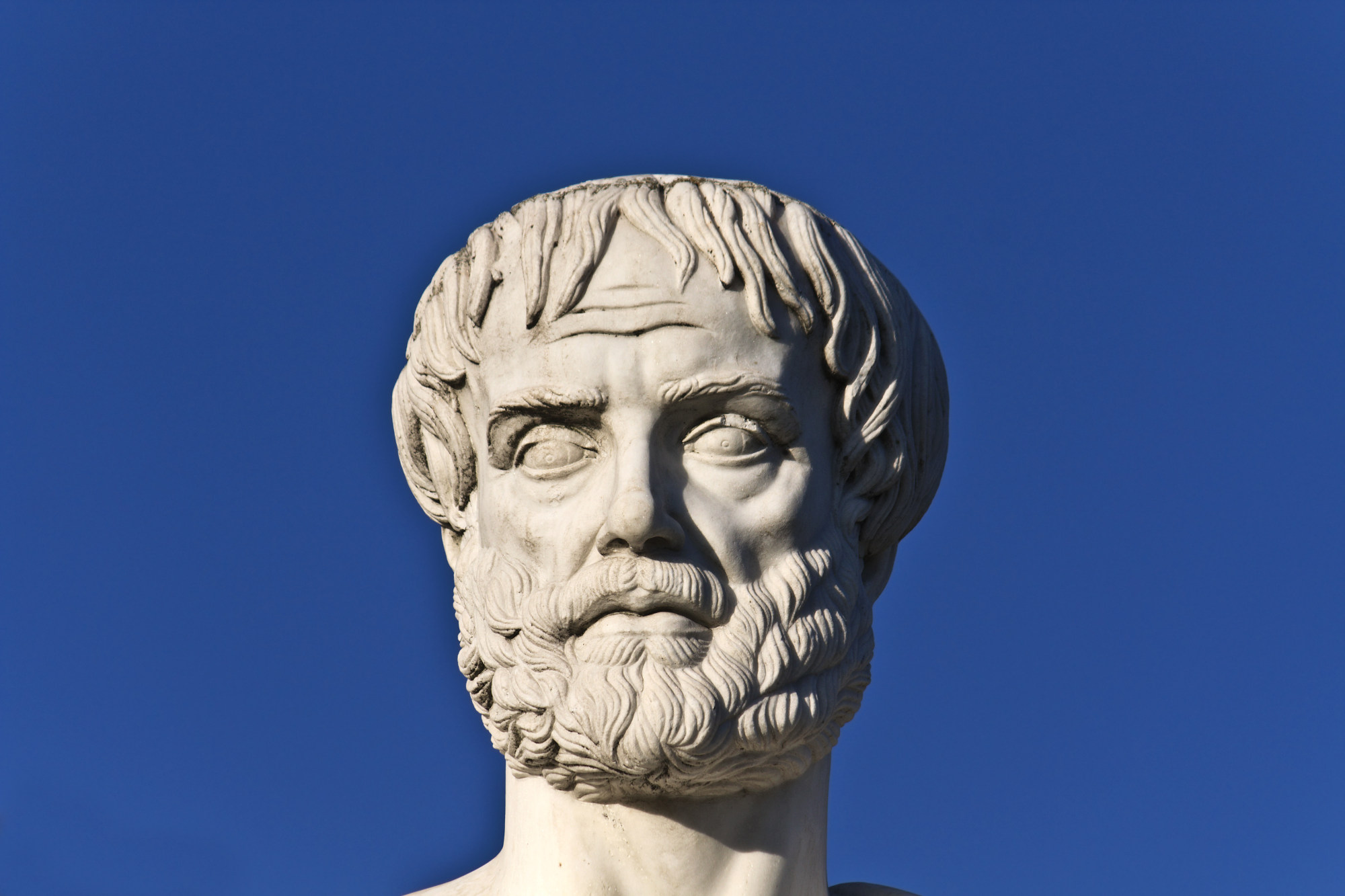
Aristotle becomes latest casualty in China’s narrative war with the West as scholar questions philosopher’s existence
- Chinese politics expert goes viral by claiming ancient Greek’s legacy not supported by written record, but mainstream historians disagree
- The statements reflect growing trend among nationalist intellectuals who argue the world needs a less Western-centric version of history
Jin claims there is no written record from before the 13th century that can prove Aristotle’s existence, and the ancient philosopher, if he existed more than 2,000 years ago, could not have written hundreds of books containing millions of words before the arrival of paper in Europe in the 11th century.
“Aristotle just popped up, and what made it more suspicious was that he seems to have an all-encompassing body of knowledge, ranging from optics and ethics to economics and politics,” he said in the video.
Mainstream historians have criticised Jin’s argument as superficial and flawed, noting that similar questions could be raised about China’s ancient philosophers such as Lao Tzu.
Nationalistic scholars in China have called for a re-examination of Western narratives and history, which they say should be judged on the same standards used to assess Chinese history.
China’s Xi hails cultural continuity for powering nation’s rise
“It can even be said that this ‘West-centric view’ still dominates the field of Western social sciences,” he said, adding that “many Chinese have also been deeply influenced by it, which is one of the reasons contributing to their lack of cultural self-confidence”.
“I believe that the task of deconstructing such a stance is still a long and challenging journey, but we have the confidence to continue and do it well,” Zhang said.
The Chinese civilisation is “the only uninterrupted one in the world”, Xi said, adding that cultural inheritance, innovation and development were key factors for China to grow into a global cultural powerhouse.
Ancient Greece is widely considered the birthplace of democracy and Western civilisation, and Aristotle, born in 384 BC, was one of its most prolific and influential figures.
The polymath has been credited with authoring between 400 and 1,000 books spanning the natural sciences, philosophy, linguistics, economics, politics, psychology and the arts. The philosophical tradition that followed him is thought to have set the groundwork for the development of modern science.
In his viral video, Jin questioned how the works of Aristotle, who was said to have written 3 million words on parchment in his lifetime, could have been recorded on the ancient writing material, as sheepskin was expensive and hard to access.
“According to the analysis of some experts, 3 million words means that, even if all the sheepskins produced in 100 years across the whole region – from the Mediterranean, Europe … to the Black Sea – were given to Aristotle, the materials would not have been enough,” Jin said.
Xi Jinping invokes China’s past to rally confidence in its future
“There is copious evidence of philosophers engaging with Aristotle’s ideas and even quoting his texts as early as the 3rd century [BC],” said Jeremy McInerney, professor of classical studies at the University of Pennsylvania.
Regarding Jin’s claims about Aristotle’s preferred writing material, several scholars asserted that he probably was not writing on parchment most of the time.
“He would have been writing on papyrus, the standard platform for Greek writing,” said Paul Kosmin, professor of ancient history at Harvard University.
Before the invention of paper in China some 2,200 years ago, Egyptians had mastered the art of creating a paper-like material from the stem of the papyrus plant. Papyrus was the chief writing material in ancient Egypt and was also used widely by the Greeks and Romans.
Even if Aristotle used parchment, it might not have been as expensive as Jin claimed. McInerney said that text on papyrus and parchment could be scraped off, allowing the material to be reused, so its cost was “not quite as exorbitant as one imagines”.

Jin also expressed scepticism that Aristotle could have written 3 million words, noting that some of the oldest classical works by Chinese philosophers contained just thousands of words.
“He wrote too much,” Jin said.
It is uncertain how many words Aristotle actually wrote. “A rough estimation is 1 to 1.2 million words,” said Xu Songyan, director of the Centre for Hellenic Studies at Southwest University in Chongqing.
Xu added that since Aristotle’s works were written in Greek, the word count could not be compared to other ancient thinkers writing in Chinese.
On top of that, Aristotle did not complete these works alone. “Around 10 people worked for Aristotle, and his students helped to write down some of his oral speech,” Xu said.
McInerney said it was very likely that “Aristotle had a philosophical school at work behind him so that some of the grunt work was done by his students”.
“If we doubt that Aristotle wrote as much as he’s reputed to have written, then we’d have to doubt the veracity of many other authors’ oeuvres,” said Eric Brown, associate professor of philosophy at Washington University in St Louis.
“Any scepticism powerful enough to cast doubt on Aristotle’s existence should be doubtful about the existence of almost everyone who has been dead for more than a couple of centuries,” Brown said.
“There are reasons to be sceptical about some details in the ancient biographical traditions, as writers would embellish the truth to make a better story, but there is no reason to be sceptical about the very existence of the people they are writing about.”
As for the doubts about the breadth of Aristotle’s expertise, Brown noted that in the philosopher’s day, it was much easier to master a variety of disciplines because these fields of study were less developed than they are today.
Aristotle was believed to have come from a privileged economic and social background, which probably contributed to his mastery of a wide range of fields, Xu said.
Aristotle’s father is believed to have been the doctor to King Amyntas III of Macedonia. After finishing his education at Plato’s Academy in Athens, Aristotle served as the tutor of Alexander the Great, who succeeded his father Philip II to the throne in 336 BC at the age of 20.
“Aristotle’s research career relied heavily on the resources provided by his student,” Xu said. For instance, during his expedition to Persia, Alexander the Great collected plant and animal specimens from across the region and brought them back so Aristotle could conduct research.
Alexander the Great also instructed the Greek city-states to prepare local information for Aristotle, which served as a source for his studies on politics and governance.
For at least a decade, ancient Greece, Rome and Egypt have been targets for nationalist academics in China, who have encouraged scepticism about these civilisations and their achievements.
This group gained visibility around 2013 when He Xin, formerly a researcher at the Chinese Academy of Social Sciences (CASS), published his book Research on Pseudo-history of Greece.
He claimed that several classics of ancient Greek literature, such as Homer’s epics, were the work of Renaissance-era forgers. Like Jin, he also suggested that Aristotle never existed.
“He is regarded as the core figure of a group called ‘the pseudo-history school’ in China,” Xu said.
Soon after, Gao Fengfeng, a professor at Peking University, denounced this group as “academic yihetuan”, using the Chinese word for the Boxers – the secret society that launched an anti-foreign and anti-colonial insurrection in northern China in the late 19th century.
Xu said that based on publicly available information, there was no evidence that “pseudo-history” projects were sponsored by government funding.
Ancient Chinese gold mask raises wealth of questions about Shang culture
It is not just Chinese scholars who have challenged the story of Aristotle. In the 1950s, the Guyanese-American historian George James published his book Stolen Legacy, which argues the philosopher’s ideas did not come from Greece but were taken from the ancient Egyptians.
In the 1987 book Black Athena: The Afro-Asiatic Roots of Classical Civilisation, the British scholar Martin Bernal also sought to challenge the mainstream understanding of classical civilisation, proposing that ancient Greece had been colonised and influenced by the Egyptians and Phoenicians.
While these theories are considered fringe within academia, they have gained traction on Chinese social media. On Douyin, the question “is ancient Greek civilisation fabricated?” is one of the top suggestions that appears when searching for “ancient Greece”.
“Whether these views are correct is secondary; the key is that we dare to question the origins of Western civilisation,” said a Weibo user surnamed Lu in response to Jin’s viral video.
“This is an incredibly brave expression. For over a century, we have been prostrating ourselves before Western civilisation, which is not right,” Lu wrote, suggesting Chinese scholars should conduct research to “thoroughly expose the vulnerabilities of Western civilisation”.


.jpg?itok=iQz726J3)